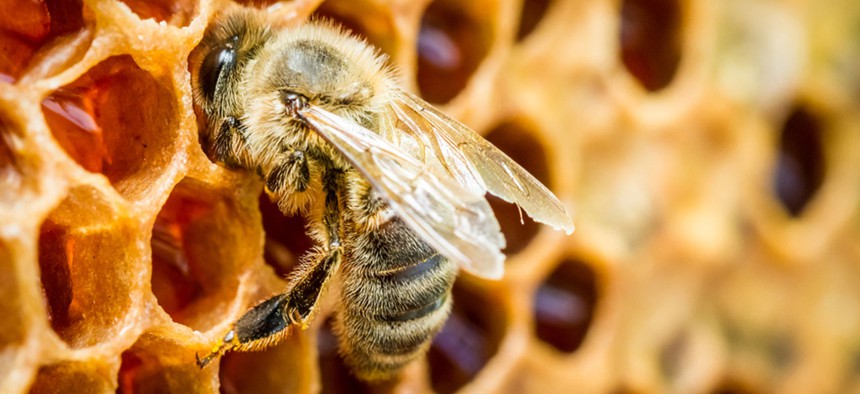
Shaiith/Shutterstock.com
Whistleblower: USDA Suppressed Findings About a Pesticide That Could Endanger Bees
These pesticides are big business.
A government scientist has accused the United States Department of Agriculture of suppressing his research that criticized a commonly used kind of pesticide that’s been linked to the widespread death of bees, Harvest Public Media reports.
At the heart of the matter are neonicotinoids pesticides or “neonics,” which are used on almost all corn and canola crops, most soybeans, cotton, wheat, and a number of other smaller crops in the US. If the government were to formally recognize the danger (or inefficacy) of the pesticide, it would have huge impacts on American agriculture, the food supply—and a number of mega-corporations.
Jonathan Lundgren, a senior research entomologist at the USDA, has published several papers on both the ineffectiveness and potential dangers of such technology-based pesticides. In March 2014, he also reviewed a report for the Center for Food Safety that criticized the overuse of neonics, finding that they do not actually provide farmers with economic benefits when compared to other pest management systems. In his whistleblower complaint, Lundgren alleges that since doing several media interviews about the paper, he and his lab group have been put through “utter hell.”
While “neonics” were originally developed because they were considered safer for mammals, recent research has strongly suggested that they are connected with the multi-continent mass bee deaths. Approximately $15 billion of US crops are dependent on bees and other pollinators, making their endangerment a matter of national food security. However, neonics are also manufactured by major chemical companies, including Syngenta and Bayer AG, which have been activelyfighting the perception that their products are dangerous.
After doing the media interviews, Lundgren says he was urged to stop speaking to the press and told he needed permission from higher ups to participate in any further conversations with press. When he contacted the director of information technology in April 2014, he says he was told of a rumor that public disruptions from within the agency were not wanted because of the Secretary of Agriculture’s presidential aspirations. Lundgren says he was also subjected to a five month “‘investigation'” of his alleged misconduct. He had other problems as well: Five of eight of his employees have also faced disruption from within the agency; old research proposals suddenly became problematic; several opportunities to speak at scientific conferences abroad were denied; and he was told he couldn’t use his Gmail account while he traveled, even though his USDA account was only accessible from agency-approved computers.
The USDA told Quartz that it “has implemented a strong scientific integrity policy to promote a culture of excellence and transparency.” It specifically noted that there are procedures for staff to report problems like perceived interference with their work. “We take the integrity of our scientists seriously and we recognize how critical that is to maintaining widespread confidence in our research among the scientific community, policy-makers, and the general public.” While the agency does not discuss individual cases, it does review allegations and make the results of the reviews publicly available online.
(Image via Shaiith/Shutterstock.com)






